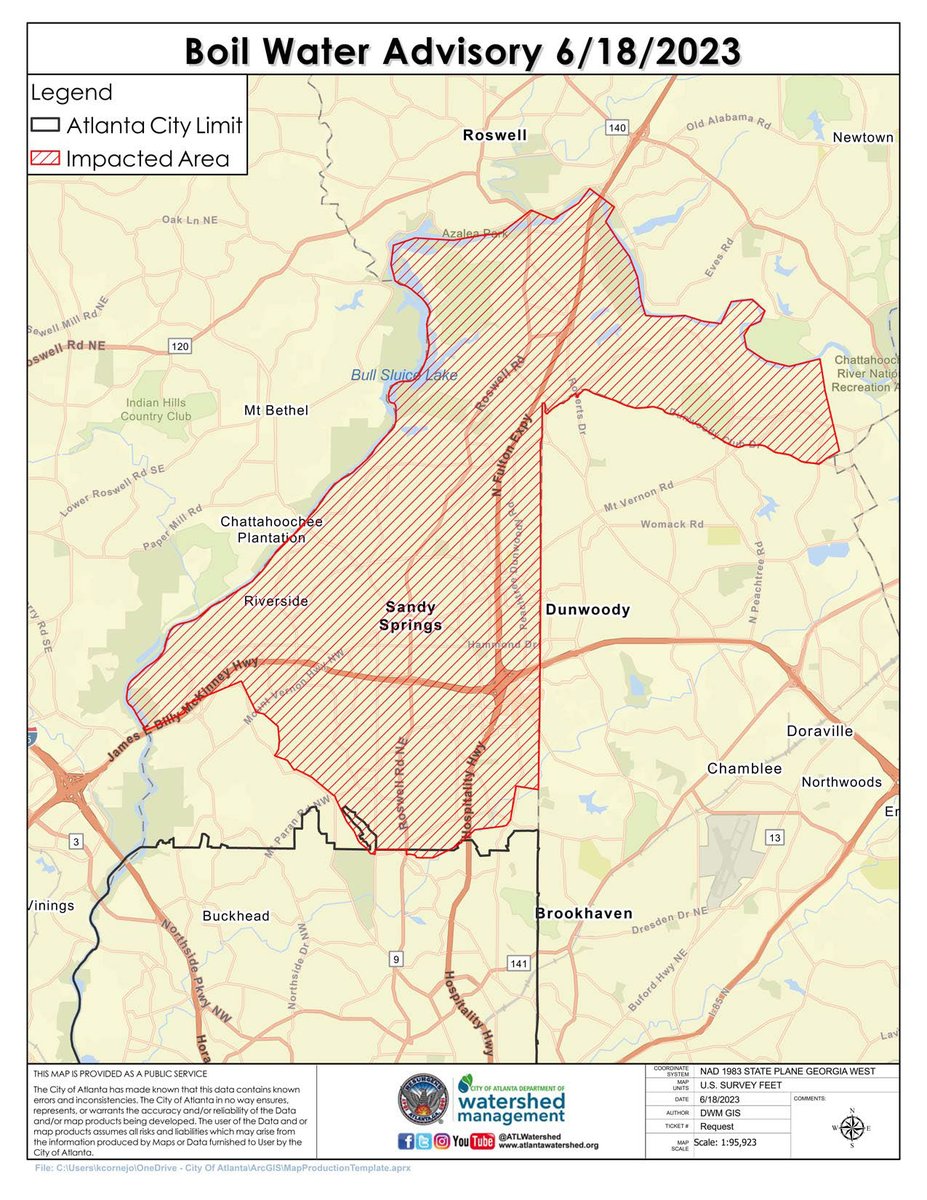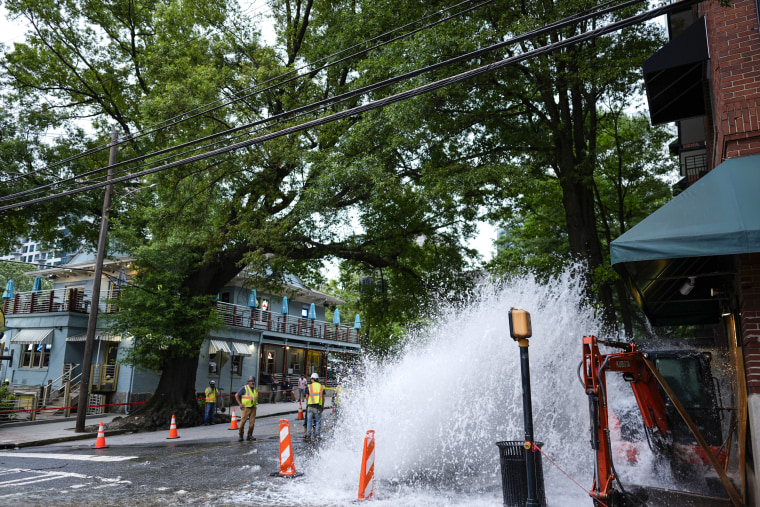Atlanta Water Status: A Comprehensive Guide To Current Updates And Future Outlook
Atlanta's water status has been a growing concern for residents, policymakers, and environmentalists alike. As one of the fastest-growing cities in the United States, Atlanta's water infrastructure faces unique challenges that demand attention. The city's water supply system, which serves millions of people, is under constant scrutiny as it balances the needs of urban growth with environmental sustainability. Understanding the current state of Atlanta's water system is crucial for both residents and stakeholders.
Atlanta's water status is not just a local issue but also a reflection of broader global water management challenges. With increasing population density and climate change impacts, the city's water infrastructure is being tested like never before. This article aims to provide a detailed overview of Atlanta's water status, including its current challenges, ongoing projects, and future plans.
By exploring the intricacies of Atlanta's water system, we can better understand the steps being taken to ensure a sustainable water supply for future generations. Whether you're a concerned citizen, a policymaker, or an environmental advocate, this article will equip you with the knowledge and insights needed to engage in meaningful discussions about Atlanta's water future.
- Whats Wrong With Ozzy
- 20th Of January Star Sign
- The Beatles Walking Across The Street
- Jujutsu Kaisen Garlic Sauce
- Who Is Anderson Cooper Seeing
Table of Contents
- Introduction to Atlanta Water Status
- Current Challenges in Atlanta's Water System
- Overview of Atlanta's Water Infrastructure
- Impact of Climate Change on Water Supply
- Water Conservation Efforts in Atlanta
- Ongoing Projects and Initiatives
- Future Plans for Water Management
- Community Involvement and Advocacy
- Key Data and Statistics
- Conclusion and Call to Action
Introduction to Atlanta Water Status
Understanding the Importance of Water Management
Atlanta water status is a critical topic that affects every resident and business in the city. Water is a fundamental resource that supports daily life, economic activities, and environmental health. Effective water management ensures that there is a reliable supply of clean water for drinking, agriculture, industry, and recreation. However, managing water resources in a rapidly growing city like Atlanta comes with its own set of challenges.
The city's water infrastructure has been in place for decades, and while it has served the population well, it now faces the pressure of supporting a growing number of residents and businesses. Aging pipes, leaks, and inefficiencies in the system contribute to water wastage and increased operational costs. Addressing these issues requires a comprehensive approach that involves both short-term solutions and long-term strategies.
Current Challenges in Atlanta's Water System
Key Issues Affecting Water Supply
Atlanta's water system faces several challenges that threaten its ability to provide a consistent and reliable water supply. Some of the most pressing issues include aging infrastructure, water leaks, and the impact of climate change. These challenges are not unique to Atlanta but are magnified by the city's rapid growth and changing weather patterns.
- Howie Mandel Obsessive Compulsive Disorder
- How Old Was Jennifer Gray In Dirty Dancing
- Karate Kid Cast Now Jaden Smith
- Phil Collins Youll Be In My Heart
- Man Put Fireworks On His Head
- Aging Infrastructure: Many of Atlanta's water pipes and treatment facilities were built decades ago and are now reaching the end of their lifespan. This increases the risk of leaks and water contamination.
- Water Leaks: Leaks in the water distribution system result in significant water wastage. According to recent estimates, Atlanta loses millions of gallons of water each year due to leaks.
- Climate Change: Changes in weather patterns, such as increased rainfall and droughts, affect the availability and quality of water. Extreme weather events can also damage water infrastructure, leading to service disruptions.
Overview of Atlanta's Water Infrastructure
How Atlanta's Water System Works
Atlanta's water infrastructure is a complex network of reservoirs, treatment plants, and distribution pipes that deliver water to millions of residents and businesses. The city relies on several key water sources, including the Chattahoochee River and Lake Lanier, to meet its water needs. These sources are managed by the Atlanta Department of Watershed Management, which is responsible for ensuring the quality and reliability of the city's water supply.
Despite its complexity, Atlanta's water system faces significant challenges due to its age and the increasing demands placed on it. Upgrading and maintaining this infrastructure is essential to ensure a sustainable water supply for the future. Investments in new technologies and infrastructure improvements are critical to addressing these challenges.
Impact of Climate Change on Water Supply
How Climate Change Affects Atlanta's Water Resources
Climate change poses a significant threat to Atlanta's water supply by altering weather patterns and increasing the frequency of extreme weather events. Rising temperatures, changing precipitation patterns, and increased evaporation rates all impact the availability and quality of water. These changes can lead to water shortages during dry periods and flooding during heavy rainfall events.
To mitigate the effects of climate change, Atlanta is implementing strategies to improve water efficiency and reduce vulnerability to extreme weather. This includes upgrading infrastructure to handle increased rainfall, implementing water conservation measures, and exploring alternative water sources such as recycled water and rainwater harvesting.
Water Conservation Efforts in Atlanta
Steps Taken to Preserve Water Resources
Atlanta has implemented several water conservation efforts to address the challenges facing its water supply. These efforts focus on reducing water wastage, promoting efficient water use, and educating the public about the importance of water conservation. Some of the key initiatives include:
- Water Efficiency Programs: Atlanta offers programs to help residents and businesses reduce water consumption through efficient appliances and practices.
- Public Education Campaigns: The city conducts campaigns to raise awareness about water conservation and encourage behavior changes that reduce water usage.
- Leak Detection and Repair: Atlanta invests in technology to detect and repair leaks in the water distribution system, reducing water wastage.
Ongoing Projects and Initiatives
Innovative Solutions for Water Management
Atlanta is actively working on several projects and initiatives to improve its water management capabilities. These projects aim to address the challenges facing the city's water system and ensure a sustainable water supply for the future. Some of the ongoing projects include:
- Infrastructure Upgrades: The city is investing in upgrading its water treatment plants and distribution pipes to improve efficiency and reduce leaks.
- Smart Water Technology: Atlanta is exploring the use of smart water meters and sensors to monitor water usage and detect leaks in real-time.
- Green Infrastructure: The city is implementing green infrastructure projects, such as rain gardens and permeable pavements, to manage stormwater and reduce runoff.
Future Plans for Water Management
Strategies for Long-Term Sustainability
Atlanta has ambitious plans for the future of its water management system. These plans focus on achieving long-term sustainability by addressing the root causes of water supply challenges. Some of the key strategies include:
- Water Source Diversification: The city is exploring alternative water sources, such as recycled water and desalination, to reduce reliance on traditional water sources.
- Climate Adaptation: Atlanta is developing strategies to adapt to the impacts of climate change, including improved flood management and drought resilience.
- Community Engagement: The city plans to involve the community in water management decisions, ensuring that all stakeholders have a voice in shaping the future of Atlanta's water system.
Community Involvement and Advocacy
How Residents Can Contribute to Water Conservation
Community involvement is essential for the success of Atlanta's water management efforts. Residents and businesses can play a vital role in conserving water and supporting sustainable water practices. Some ways to get involved include:
- Participating in Water Conservation Programs: Join city-sponsored programs that promote water efficiency and conservation.
- Reporting Water Leaks: Report leaks in the water distribution system to help reduce water wastage.
- Advocating for Sustainable Practices: Support policies and initiatives that promote sustainable water management and environmental protection.
Key Data and Statistics
Understanding the Numbers Behind Atlanta's Water Status
Data and statistics provide valuable insights into Atlanta's water status and the challenges facing its water system. Some key figures include:
- Water Consumption: Atlanta residents consume an average of 100 gallons of water per person per day.
- Water Loss: The city loses approximately 20% of its treated water due to leaks in the distribution system.
- Infrastructure Investment: Atlanta plans to invest over $1 billion in water infrastructure upgrades over the next decade.
These statistics highlight the importance of addressing water management challenges and investing in sustainable solutions.
Conclusion and Call to Action
Taking Action for Atlanta's Water Future
Atlanta water status is a critical issue that demands attention and action from all stakeholders. By understanding the challenges facing the city's water system and supporting efforts to address them, we can ensure a sustainable water supply for future generations. Whether through personal conservation efforts, community involvement, or advocacy for sustainable policies, everyone has a role to play in shaping Atlanta's water future.
We invite you to take action by implementing water conservation practices in your daily life, supporting city initiatives, and staying informed about water management issues. Share this article with others to spread awareness and encourage meaningful discussions about Atlanta's water status. Together, we can make a difference and secure a sustainable water future for Atlanta.
Article Recommendations
- Shampoo To Encourage Hair Growth
- Kelly And Kenny From Love Is Blind
- Hold On I Still Want You
- The Monsters Eric And Lyle
- Hocus Pocus The Rise Of The Sandersons



Detail Author:
- Name : Prof. Lue Veum I
- Username : monserrate.kub
- Email : reid33@bednar.com
- Birthdate : 1981-11-11
- Address : 964 Wolf Creek North Jayson, VA 72884
- Phone : 559.645.8083
- Company : Bruen LLC
- Job : Stone Cutter
- Bio : Quo ratione occaecati doloremque sit. Vitae voluptatum quo iure nisi corrupti iure vero. Excepturi quia illum quia ab reprehenderit.
Socials
linkedin:
- url : https://linkedin.com/in/rosiefunk
- username : rosiefunk
- bio : Assumenda rerum error eum qui dolor error.
- followers : 4930
- following : 835
facebook:
- url : https://facebook.com/funk1975
- username : funk1975
- bio : Id sint cupiditate quis et facere dolorum maiores.
- followers : 3261
- following : 983